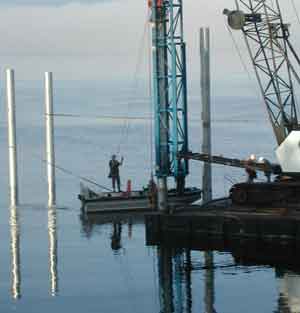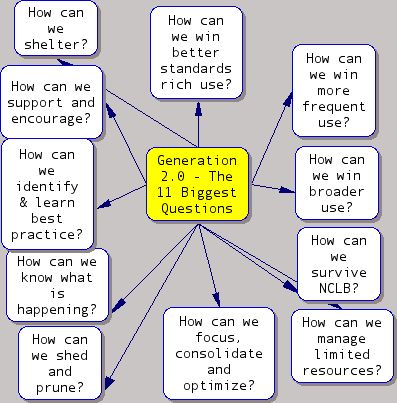 How can we win standards-rich use?
How can we win standards-rich use?
During the early stages, schools were too often engaged in technology for technology’s sake. During Generation 2.0 focus shifts to pedagogy, curriculum and student learning.
No technology before it’s time or its time!
For a thorough explanation of a curriculum planning process that puts learning ahead of technology and the program horse in front of the technology cart, consult the following article from FNO:
"First Things First: Networking for Student Learning"
http://www.fno.org/nov00/f1.html
 How can we win broader use?
How can we win broader use?
During the early stages, schools paid too much attention to early adopters. During Generation 2.0 focus shifts to understanding and winning over the late adopters, reluctants and skeptics. Each school community probably contains 4-8 "market segments" - types of teachers with differing needs, styles and preferences. To win them over to the value of new technologies, we must tailor our efforts segment by segment.
The following FNO articles offer specific strategies to recruit the enthusiastic and earnest engagement of these groups:
"Reaching the Reluctants"
http://staffdevelop.org/reluctant.html
"Stories of Adult Learning"
http://www.fno.org/sum03/adult.html
 How can we win more frequent use?
How can we win more frequent use?
During the early stages, schools paid too little attention to value.
Now they must invest heavily in professional development and program development.
Schools must create or buy lessons that are directly related to standards and results.
When teachers see lessons that will make a difference on Monday morning, they are more likely to embrace the strategy.
"The Slam Dunk Digital Lesson"
http://www.fno.org/sept02/slamdunk.html
 How can we identify & learn best practice?
How can we identify & learn best practice?
During the early stages, it was enough to use technology.
There has been little data gathering and little evidence of results.
It is time to ask for evidence and to gather evidence locally.
Beware of testimonials and self-promoters - the self-proclaimed miracle workers.
When governors, commissioners and leaders claim they have made miracles, it is time to question the data. Sometimes we find "fuzzy math" and Enron accounting beneath the claims.
"Tech Smart: Making Discerning Technology Choices"
http://www.fno.org/may02/discerning.html
 How can we focus, consolidate and optimize?
How can we focus, consolidate and optimize?
During the early stages schools were all over the map.
Leadership now sets the stage for focus and quality.
The administration of the district and the school gives permission to stick to the knitting.
"Focus on the Locus"
"The Technology Presumption"
http://www.fno.org/may03/covmay.html
 How can we know what is happening?
How can we know what is happening?
During the early stages, schools rarely gathered data to measure impacts. During Generation 2.0 assessment becomes a priority to guide program development.
The following FNO article shows how to conduct such assessments with a focus on curriculum and student learning:
"Evaluating the Maine Laptop Program"
http://www.fno.org/jun03/maine.html
 How can we support and encourage?
How can we support and encourage?
During the early stages, schools expected the technology to work miracles.
Too little attention was devoted to the emotional dimensions of change.
Now we work on teaming, we provide support resources and we stress organizational development - a culture of encouragement.
"The True Cost of Ownership"
http://fno.org/mar03/truecost.html
 How can we manage limited resources?
How can we manage limited resources?
During the early stages many schools spread their equipment thinly across classrooms.
Now we seek critical mass - just in time technology.
We move equipment around, share, schedule and put it where it will do the most good.
When fads appear we sometimes say No!
"Just in Time Technology"
http://fno.org/jan03/jitt.html
 How can we shed and prune?
How can we shed and prune?
During the early stages, schools usually planted too many seedlings.
During Generation 2.0, schools will thin, prune, discontinue and cut back some elements so that others might thrive. We make data enlightened choices.
"Weeding the Garden"
http://fno.org/feb01/weeding.html
 How can we shelter?
How can we shelter?
During the early stages, the rush to spread technologies throughout classrooms created churn, frustration, stress and turbulence. During Generation 2.0 focus shifts to minimize trendy, silly uses and concentrate on worthy uses as well as organizational health.
Turbulence can undermine the effectiveness of a program.
Trendy new fashions and bandwagons can divert teachers from their real business.
Teachers nurture growth and learning when they can count on reasonable levels of support and predictability. Pushed to the wall by stress and churn, they plummet to what Maslow called the survival stage. At this stage, they are consumed by what Fullan identified as the "daily press" - just getting the basic job done. Thrown off balance, they are more apt to cling to routines and limit experimentation.
Smart leaders protect schools and teachers from too much change too fast. They shelter the school from "The New New Thing" - see the article in the April 2000 issue of FNO at http://fno.org/apr2000/newnew.html.
Shelter from the storm. Shelter from the fad.
 How can we survive NCLB?
How can we survive NCLB?
The technology bandwagon predated AYP penalties.
Student performance and literacies become priorities.
Pedagogy is paramount.
Toolishness is foolishness.
Invest in professional development.
"Pedagogy DOES Matter!"
http://www.fno.org/sept03/pedagogy.html
 From Now On
From Now On


 How can we win standards-rich use?
How can we win standards-rich use? How can we win broader use?
How can we win broader use? How can we win more frequent use?
How can we win more frequent use? How can we identify & learn best practice?
How can we identify & learn best practice? How can we focus, consolidate and optimize?
How can we focus, consolidate and optimize? How can we know what is happening?
How can we know what is happening? How can we support and encourage?
How can we support and encourage? How can we manage limited resources?
How can we manage limited resources? How can we shed and prune?
How can we shed and prune? How can we shelter?
How can we shelter? How can we survive NCLB?
How can we survive NCLB?